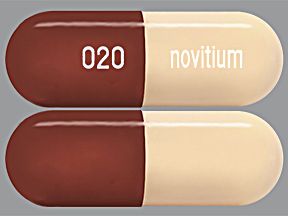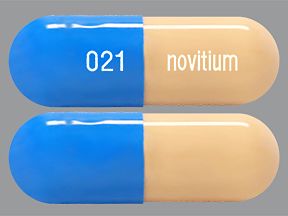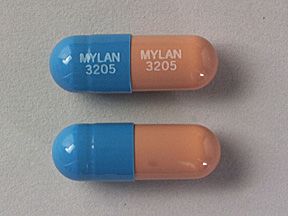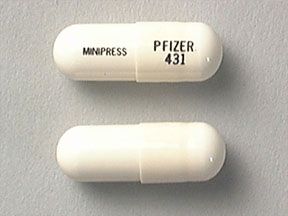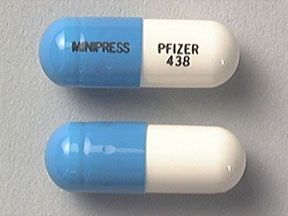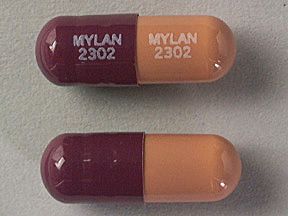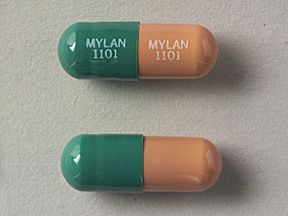Highlights for prazosin
- Prazosin oral capsule is available as a generic drug and a brand-name drug. Brand name: Minipress.
- Prazosin comes only as a capsule you take by mouth.
- Prazosin oral capsule is used to treat high blood pressure (hypertension). It can be used alone or in combination with other medications to help lower your blood pressure.
- Loss of consciousness warning: Because this medication lowers your blood pressure, prazosin may cause you to pass out, faint, or suddenly lose consciousness. This can happen within 30 to 90 minutes of your first dose of prazosin. It can also happen if your prazosin dose is increased too quickly, or if you’re already on a high dose of prazosin and you’re started on another blood pressure medication.
- Prolonged erections warning: Prazosin may cause priapism (prolonged erections). If you have an erection that lasts more than four hours, call your doctor or seek emergency medical help right away. If this isn’t treated, it may result in erectile dysfunction or tissue scarring.
- Intraoperative floppy iris syndrome warning: If you have cataracts and need surgery, be aware that prazosin may increase your risk for complications during surgery known as intraoperative floppy iris syndrome (IFIS). If you need eye surgery, let your eye doctor know that you’re taking prazosin. The doctor may give you medications before surgery or perform the surgery using different techniques to help decrease your risk for IFIS.
Prazosin is a prescription drug. It comes as an oral capsule.
Prazosin oral capsule is available as the brand-name drug Minipress as well as in a generic version. Generic drugs usually cost less than the brand-name version. In some cases, they may not be available in all strengths or forms as the brand-name drug.
This drug may be used as part of a combination therapy. That means you need to take it with other drugs.
Why it’s used
Prazosin is used to lower your blood pressure. If your blood pressure stays too high, it can put you at risk for serious health problems such as heart attack and stroke.
How it works
Prazosin belongs to a class of drugs called alpha blockers. A class of drugs is a group of medications that work in a similar way. These drugs are often used to treat similar conditions.
Your blood pressure can increase when your blood vessels constrict and get narrower. Prazosin works by relaxing your blood vessels so that blood will flow more easily through them. This helps make your blood pressure decrease.
Prazosin oral capsule may cause dizziness and drowsiness after your first dose. Avoid driving or performing any hazardous tasks for the first 24 hours after taking this medication or when your dose is increased.
This drug can also cause other side effects.
More common side effects
The more common side effects of prazosin include:
- dizziness
- drowsiness
- lightheadedness
- headache
- lack of energy
- weakness
- palpitations (feel like your heart is racing or fluttering)
- nausea
If these effects are mild, they may disappear within a few days or a couple of weeks. If they’re more severe or don’t disappear, talk to your doctor or pharmacist.
Serious side effects
Call your doctor right away if you have serious side effects. Call 911 if your symptoms feel life-threatening or if you think you’re having a medical emergency. Serious side effects and their symptoms can include the following:
- loss of consciousness (this can occur if you stand up too quickly after sitting or lying down)
- an erection lasting more than four hours
- very fast heartbeat
- swelling of your hands and feet
- difficulty breathing
- depression
- allergic reactions, with symptoms that can include:
- skin rash
- hives
- swelling of the lips, face, or tongue
- trouble breathing
Disclaimer: Our goal is to provide you with the most relevant and current information. However, because drugs affect each person differently, we cannot guarantee that this information includes all possible side effects. This information is not a substitute for medical advice. Always discuss possible side effects with a healthcare provider who knows your medical history.
Prazosin oral capsule can interact with other medications, vitamins, or herbs you may be taking. An interaction is when a substance changes the way a drug works. This can be harmful or prevent the drug from working well.
To help avoid interactions, your doctor should manage all of your medications carefully. Be sure to tell your doctor about all medications, vitamins, or herbs you’re taking. To find out how this drug might interact with something else you’re taking, talk to your doctor or pharmacist.
Examples of drugs that can cause interactions with prazosin are listed below.
Other blood pressure drugs
If you take prazosin together with other blood pressure drugs, they will decrease your blood pressure even more and may drop it to a dangerously low level. Your doctor can help you avoid this by reducing your prazosin dosage, adding any other blood pressure medications carefully, and then increasing your prazosin dosage slowly. Your doctor may also have you check your blood pressure more often.
Examples of other blood pressure drugs include:
- metoprolol
- atenolol
- carvedilol
- lisinopril
- losartan
- valsartan
- hydrochlorothiazide
- amlodipine
- clonidine
Erectile dysfunction drugs
Erectile dysfunction drugs can lower your blood pressure. Taking any of these drugs with prazosin will lower your blood pressure even more and may drop it to a dangerously low level. Your doctor may choose to adjust your dosage or avoid this combination of drugs.
Examples of erectile dysfunction drugs include:
- avanafil
- sildenafil
- tadalafil
- vardenafil
Disclaimer: Our goal is to provide you with the most relevant and current information. However, because drugs interact differently in each person, we cannot guarantee that this information includes all possible interactions. This information is not a substitute for medical advice. Always speak with your healthcare provider about possible interactions with all prescription drugs, vitamins, herbs and supplements, and over-the-counter drugs that you are taking.
This drug comes with several warnings.
Allergy warning
Prazosin may cause a severe allergic reaction. Symptoms may include:
- skin rash
- hives
- swelling of the lips, face, or tongue
- trouble breathing
Call 911 or go to the nearest emergency room if you develop these symptoms.
Don’t take this drug again if you’ve ever had an allergic reaction to it. Taking it again could be fatal (cause death).
Alcohol interaction warning
If you drink alcohol while taking prazosin, you may experience dizziness, lightheadedness, and fainting.
Warnings for people with certain health conditions
For people with heart problems: Use prazosin with caution if you have heart failure, swelling of your hands and feet (edema), a tendency to get very dizzy or lightheaded when you stand from a lying or sitting position (orthostatic hypotension), or a type of chest pain called angina. Prazosin may worsen these conditions.
For people with eye problems: Prazosin can cause blurry vision and eye pain. If you already have eye problems such as cataracts and need surgery, prazosin may increase your risk for serious complications during eye surgery.
Warnings for other groups
For pregnant women: Research in animals has shown harmful effects to the fetus when the mother takes prazosin. However, there haven’t been enough studies done in humans to be certain how the drug might affect the fetus.
Speak with your doctor if you’re pregnant or planning to become pregnant. Prazosin should be used during pregnancy only if the potential benefit justifies the potential risk.
For women who are breastfeeding: Prazosin passes through breast milk. Talk to your doctor before breastfeeding while taking prazosin.
For seniors: If you’re 65 years or older and you take prazosin, you’re at an increased risk for a sudden drop in blood pressure when you stand up after sitting or lying down (orthostatic hypotension). This can cause dizziness and lightheadedness. Your doctor may start you on a lower dosage, monitor your blood pressure more closely, or choose a different blood pressure drug for you.
For children: Safety and effectiveness in children haven’t been established.
All possible dosages and forms may not be included here. Your dose, form, and how often you take it will depend on:
- your age
- the condition being treated
- the severity of your condition
- other medical conditions you have
- how you react to the first dose
Drug forms and strengths
Generic: Prazosin
- Form: oral capsule
- Strengths: 1 mg, 2 mg, and 5 mg
Brand: Minipress
- Form: oral capsule
- Strengths: 1 mg, 2 mg, and 5 mg
Dosage for high blood pressure
Adult dosage (ages 18 years and older)
- Typical initial dosage: 1 mg, taken either two or three times per day as instructed by your doctor.
- Dosage increases: Your doctor may slowly increase your dosage up to a maximum of 20 mg per day, taken in evenly divided doses.
- Typical maintenance dosage: Most people will need a dosage ranging from 6 mg to 15 mg daily, taken in evenly divided doses.
Child dosage (ages 0–17 years)
This drug has not been established as safe or effective for use in people younger than 18 years.
Disclaimer: Our goal is to provide you with the most relevant and current information. However, because drugs affect each person differently, we cannot guarantee that this list includes all possible dosages. This information is not a substitute for medical advice. Always speak with your doctor or pharmacist about dosages that are right for you.
Prazosin is used for long-term treatment. It comes with serious risks if you don’t take it as prescribed.
If you stop taking the drug or don’t take it at all: If you don’t take prazosin and your blood pressure stays too high, it can put you at risk of serious health problems such as heart attack and stroke.
If you miss doses or don’t take the drug on schedule: Your medication may not work as well or may stop working completely. For this drug to work well, a certain amount needs to be in your body at all times.
If you take too much: If you take too much prazosin, you may experience a large drop in blood pressure, with symptoms such as:
- extreme dizziness
- lightheadedness
- fainting
- loss of consciousness
- shock
If you think you’ve taken too much of this drug, call your doctor or seek guidance from the American Association of Poison Control Centers at 1-800-222-1222 or through their online tool. But if your symptoms are severe, call 911 or go to the nearest emergency room right away.
What to do if you miss a dose: If you forget to take your dose, take it as soon as you remember, unless you remember just a few hours before the time for your next dose. Then only take one dose.
Never try to catch up by taking two tablets at once. This could result in dangerous side effects, such as a large drop in blood pressure.
How to tell if the drug is working: Your blood pressure should decrease.
Keep these considerations in mind if your doctor prescribes prazosin for you.
General
- Prazosin comes as capsules that may be opened if needed.
- Store prazosin at room temperature between 68°F and 77°F (20°C and 25°C).
- Protect this drug from light and moisture.
- Don’t store this medication in moist or damp areas, such as bathrooms.
Storage
Refills
A prescription for this medication is refillable. You should not need a new prescription for this medication to be refilled. Your doctor will write the number of refills authorized on your prescription.
Travel
When traveling with your medication:
- Always carry your medication with you. When flying, never put it into a checked bag. Keep it in your carry-on bag.
- Don’t worry about airport X-ray machines. They can’t hurt your medication.
- You may need to show airport staff the pharmacy label for your medication. Always carry the original prescription-labeled container with you.
- Don’t put this medication in your car’s glove compartment or leave it in the car. Be sure to avoid doing this when the weather is very hot or very cold.
Self-management
Your doctor may recommend that you check and record your blood pressure daily.
If your doctor instructs you to monitor and record your blood pressure daily, you’ll need a home blood pressure monitor. These are available at most pharmacies and online.
Shop online for blood pressure monitors.
Clinical monitoring
Your doctor will regularly check the following to make sure this medication is working and is safe for you:
- your blood pressure
- your heart rate (prazosin can cause a fast heart rate known as tachycardia)
There are other drugs available to treat your condition. Some may be better suited for you than others. Talk to your doctor about other drug options that may work for you.
Disclaimer: Healthline has made every effort to make certain that all information is factually correct, comprehensive, and up-to-date. However, this article should not be used as a substitute for the knowledge and expertise of a licensed healthcare professional. You should always consult your doctor or other healthcare professional before taking any medication. The drug information contained herein is subject to change and is not intended to cover all possible uses, directions, precautions, warnings, drug interactions, allergic reactions, or adverse effects. The absence of warnings or other information for a given drug does not indicate that the drug or drug combination is safe, effective, or appropriate for all patients or all specific uses.









